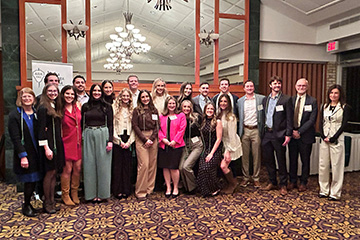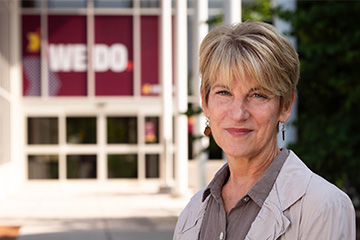College of Medicine focuses on critical need
Crises of 2020 demonstrate the importance of trained public health experts
By Robin Miner-Swartz
Adapted from Centralight Fall 2020
As Dr. George E. Kikano sees it, the crises facing Michigan and the United States today have highlighted the crucial mission of Central Michigan University's College of Medicine.
From the global pandemic and racial injustice to devastating mid-Michigan floods this summer, public health is in a bright spotlight.
"The current crises are showing us how unprepared we are on the macro level," said Kikano, vice president of health affairs and dean of CMU's College of Medicine. "As a country, we spend large dollars on health care, but our public health is undervalued and underfunded. We need a health workforce that can provide outside care for individuals and addresses larger matters in the system."
The arrival of COVID-19 has pushed public health — the science of protecting and improving the health of people and their communities — to the forefront of national conversations, and suddenly those engaged in the sector became highly visible experts.
Improving community health has been central to the College of Medicine's mission since it opened in 2013. The college focuses on preparing diverse, culturally competent physicians to provide comprehensive health care and services to underserved populations in Michigan and beyond. That's never been more important, Kikano said.
"Before 2020, the U.S. Department of Labor was saying the industry with the greatest need for employment in the next 25 years is health care," he said. It's estimated that by 2030, there will be a shortage of more than 45,000 physicians in the U.S.
"It takes over 10 years after high school to educate a physician," he said. "The crisis is coming, and we have to address it now."
The College of Medicine trains physicians to improve the health and well-being of individuals and whole communities. For a newly established college, it has developed strong partnerships in the region and is part of major initiatives bridging economic development and health care, Kikano said.
CMU offers a Master of Public Health degree — on campus and now online — that, among other things, examines how social injustice impacts public health.
"We're seeing it in the impact of COVID-19, in racial injustice and disparities, in the recent regional flooding," Kikano said. "Public health will always be important. We will have another crisis. These current crises open the doors for conversations about this critical education."
Kikano said part of the vision for CMU's College of Medicine focuses on social responsibility through medicine and public health.
In collaboration with clinical and community partners, doctors trained by CMU are driven to improve the health of patients and communities through their shared commitment to social responsibility.
They work to improve health care, wellness and economic outcomes by taking action to develop new, inclusive and progressive solutions to public health.




